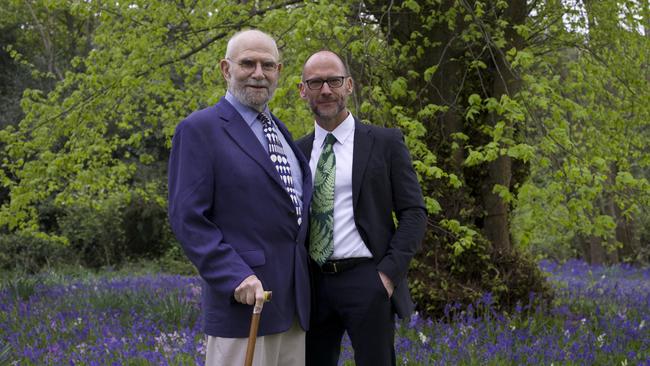Oliver Sacks’s love affair with Bill Hayes laid bare in moving memoir
Bill Hayes’s memoir is filled with Oliver Sacks’s endearing eccentricity and wonder at his late encounter with love.

In 2008, neurologist and author Oliver Sacks wrote Bill Hayes a letter of apology: he had forgotten to blurb the San Francisco-based writer’s book about the men behind the medical textbook Gray’s Anatomy. Sacks, 75, and Hayes, 49, began a correspondence.
At lunch a month later in New York, Sacks proved to be — in Hayes’s words — “brilliant, sweet, modest, handsome and prone to sudden, ebullient outbursts of boyish enthusiasm”. The two men spoke about the novelistic qualities of 19th-century medical literature.
Back home, Hayes sent Sacks a photo he had taken of the bare tree limbs in Central Park; he thought they looked like vascular capillaries, Sacks thought they looked like neurons. Hayes was “sort of smitten”. Although he moved to New York a year later without thoughts of a relationship, they started spending time together.
The joy was mutual. Sacks tells us in On the Move, the autobiography he published just before his death, that he started to keep a notebook on “falling in love”. In some ways, this relationship was a minor miracle. Deeply closeted Sacks had had never come out as gay and never been in a relationship; he hadn’t had a sexual encounter for 35 years. Hayes, the author of three books, each dedicated to Steven, his partner of 10 years, was still in mourning, having lost him to a heart attack at the age of 44.
The men would find a tender domestic equilibrium in separate apartments in the same building. Hayes would become an increasingly public fixture in Sacks’s life, and be by his side when he died of secondary melanoma in 2015.
This wonderful story of unlikely love and Sacks’s late flowering over these eight New York years are the subject of Insomniac City. Early in the relationship, Hayes recounts, his partner encouraged him to start a diary. And it’s through these small dated vignettes that we see a fluffier, happier Sacks in small moments of domestic intimacy: drinking wine and getting high on the roof, in bed, swimming, and walking through the New York Botanical Garden.
Sacks had been a much-loved public figure since the publication of Awakenings in 1973, and especially after The Man Who Mistook his Wife for a Hat in 1985, which renewed the case history as a literary form, exploring the philosophical and physical mysteries of the injured brain while maintaining a deeply humane respect for its subjects.
His decision to come out in On the Move surprised many who had come to see the grey-bearded and bespectacled author as a whimsical, avuncular presence. The cover photo of young Sacks, a handsome bear in his bicycle leathers, revealed a “surprisingly cool dude”, as one reviewer put it. Bulked from competitive weightlifting, Sacks filled his weekends with speed and drugs; but the man whose mother had described his sexuality as an “abomination” had shut down that side of himself.
And so, in such a rich accounting of a life, Sacks’s description of his relationship — “the great and unexpected gift in my old age, after a lifetime of keeping a distance” — was necessarily confined to the last pages. In Insomniac City, Hayes fills in the details, not only of Sacks’s happy grappling with an unfamiliar domesticity, but also his heroic final burst of essays.
Hayes’s fragmentary vignettes are filled with Sack’s endearing eccentricity and wonder at his late life change. He measures the temperature of his bath with an old-fashioned bath thermometer, frets about potential toxicity from inhaling fireflies, and dons swimming goggles to open a bottle of champagne.
He converses happily with actress Lauren Hutton and singer Bjork (over lunch at her house in Iceland), with little idea of who they are. Imagine a planet on which the rain falling sounds like Bach, Sacks says to Hayes as they make dinner together, and tells him that he creates the need he fills — like Jesus and Kierkegaard and smoked trout.
In fact, Hayes had already been keeping a kind of diary, in pictures. Shortly after Steven’s death, he discovered a knack for photographing people. Gregarious wandering was his way of acclimatising to New York and his images of its people and written portraits (published in Vanity Fair and The New York Times) form the other half of this book.
You can see how Hayes and Sacks were compatible, with their gifts for curiosity and happiness. But while Sacks was an expansive explorer of the deep questions at the brain’s outer limits, Hayes is a poet of the ephemeral, recording fleeting conversations with street poets, grifters, partygoers and the local newsagent.
Yet next to the vividness of the diary entries, Hayes’s city meditations can feel quite flimsy, even banal, never quite escaping the city’s cliched visions of itself. This easy sweetness creeps into the vignettes of his partner, perhaps at the cost of a more nuanced portrait. Certainly, Insomniac City is best read alongside Sacks’s writing, to be reminded of the tougher, shrewd and more rebellious self it revealed.
Yet it is also moving to see how these last years with Hayes were a great liberation for Sacks, able at last to own his whole life. My favourite story Hayes tells is not in his book but on his author page.
One day the couple discovered a leaflet for their local gay bar, advertising an “Oliver Sacks” night inspired by the photo of the young author in his leathers. Sacks hadn’t been inside a gay bar for 40 years but decided to go. Loudspeakers announced his presence to wild applause and he spent the next hour surrounded by admirers.
“Well that was nice,” Sacks said afterwards. Perhaps they could go back again another night, Hayes suggested. “No, that was enough for me,” Sacks said. “That was perfect.”
Delia Falconer is an author and critic.
Insomniac City: New York, Oliver, and Me
By Bill Hayes
Bloomsbury, 292pp, $29.99


